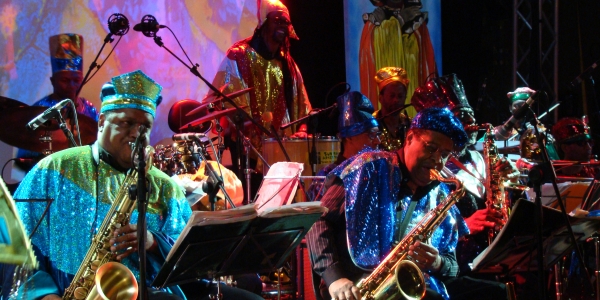By the early ‘50s, Blount had legally changed his name to Le Sony’r Ra – typically shortened to Sun Ra – and formed the earliest incarnations of the ensemble that would become known as the Sun Ra Arkestra. An elaborate blend of avant-garde jazz, ethereal philosophy and science fiction conceptual imagery, the Arkestra’s influence would bleed into the nascent rock’n’roll scene of the ‘60s, with bands such as the MC5 and The Stooges paying tribute to Sun Ra’s free-form style (decades later, Sonic Youth would invite the Arkestra to open for the New York art-punk-noise group). In subsequent years, the Sun Ra Arkestra would incorporate dancers and performance artists into the outfit’s elaborate live performances.
Marshall Allen had joined the United States army after the US joined the war in 1942. Stationed in France for the duration of the war, Allen stayed on in Paris until 1950, when he returned to the United States. Allen had played clarinet and alto saxophone while living in Paris, playing alongside seasoned jazz players such as Art Simmons, James Moody and Don Byas.
Some time after returning to the United States, Allen met Sun Ra. Sufficiently impressed with Allen’s abilities and musical aptitude, Sun Ra invited the young musician to join the nascent Sun Ra Arkestra.
“I met Sun Ra in Chicago in 1957,” Allen recalls, “and by the end of the year I’d joined his band – I’d been playing in lots of little bands, and I was looking to join a big band.” Allen was only peripherally aware of Sun Ra’s musical activities; once ensconced in the Arkestra, Allen indulged Sun Ra’s idiosyncratic philosophical approach. “Before I joined the band, I’d been playing mainly straight up and down,” Allen says. “But with Sun Ra, the techniques were all different, different intervals, mixed-up rhythms. I hadn’t experienced that before – I didn’t know what [Sun Ra] wanted. It took some to work it out. It was simple music in a sense, but you had to play it in a certain way.”
And then there was the extra-curricular aspect of Sun Ra’s musical philosophy: the blend of science fiction, religion and libertarian philosophy. “Sun Ra was talking about outer space and the Bible, and I was wondering what that had to do with the music,” Allen laughs. While Allen accepted Sun Ra’s other worldly interests, his primary preoccupation was to grasp the musical ideas within Sun Ra’s arrangements.
“I just wanted to talk about the music, and he’d have these arrangements that I wanted to understand,” Allen says. “It was a challenge, so I was gonna stay there until I got something! There was all this syncopation, rhythm changes, you had to play on your own, play your part. If I couldn’t understand all of, I’d just sit and listen, wait and see, listen to [Sun Ra] talk about it.”
Allen’s determination to be in Sun Ra’s band provided him with the discipline to come to grips with Sun Ra’s music. “I got my chance, and I had to take it, and I had to know how he wanted the music played,” Allen says. While Sun Ra’s take on jazz eschewed predictability, Allen says Sun expected his musicians to stick to their prescribed script – the music may have been free-form, but it was not a free-for-all.
“Sun Ra didn’t believe in all that freedom because you’d waste a lot of time doing all these other things,” Allen says. “You had to stop and study the music, ‘cause otherwise you couldn’t play it. And that’d make you a better musician.”
With shades of James Brown’s legendary sense of intra-band discipline, Sun Ra expected his musicians to be on time, both musically and logistically. “If you came late to a rehearsal, you wouldn’t have a part until [Sun Ra] would write you one,” Allen says. “You couldn’t just play what anyone else was playing. All that freedom wasn’t what he wanted – you had to have discipline to be in the band. I’d tell him I was playing my best, and he’d still tell me that wasn’t what he wanted,” Allen laughs.
After Sun Ra died in 1993 – followers prefer the inter-stellar concept of ‘ascending’ to describe his transition from Earth-bound existence – tenor saxophonist John Gilmore assumed the role of band leader; when Gilmore died in 1995, Allen took over the mantle, preserving and continuing to spread the spirit of Sun Ra across the world.
Now in his 90th year, Allen continues to tour the world with the Sun Ra Arkestra. In January this year, Sun Ra Arkestra will visit Australia as the guest of the Sydney Festival. Sun Ra Arkestra will also play at the Forum Theatre in Melbourne. Allen may be notionally in the twilight of his career, but he offers no sense of impending retirement from the avant-garde scene he’s been part for so many years.
“Avant-garde is about what you don’t know,” Allen says. “You can create some music, and then create some more music. I had to give up trying to be smart. Sometimes you can walk out the door, and the building falls down,” Allen laughs.
BY PATRICK EMERY







